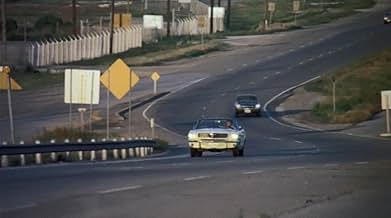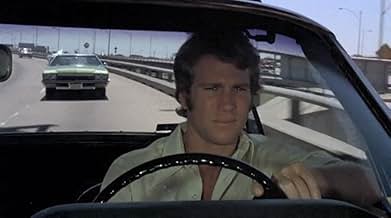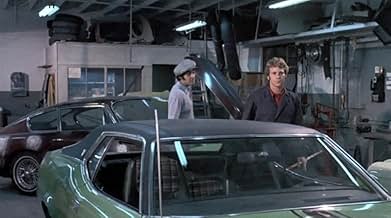PUNTUACIÓN EN IMDb
6,1/10
1,3 mil
TU PUNTUACIÓN
Añade un argumento en tu idiomaA computer programmer decides to become a thief. And when he starts making waves an insurance investigator hounds him. He also meets a woman who becomes his accomplice.A computer programmer decides to become a thief. And when he starts making waves an insurance investigator hounds him. He also meets a woman who becomes his accomplice.A computer programmer decides to become a thief. And when he starts making waves an insurance investigator hounds him. He also meets a woman who becomes his accomplice.
Ollie Ree Alridge
- Maid
- (sin acreditar)
Jim Antonio
- Poker Player
- (sin acreditar)
Army Archerd
- Newsman
- (sin acreditar)
Argumento
¿Sabías que...?
- CuriosidadesJacqueline Bisset took over the role of Laura from Charlotte Rampling, who bowed out because of pregnancy. [VARIETY, Mar 15, 1972]
- PifiasTravis is pulled over by police and is asked for the car's registration. In the 1970s, Texas did not require that the registration be kept in the car, and officers did not ask for it. Hollywood got it wrong because in California drivers were required to present their "registration".
- ConexionesFeatured in Gazap Rüzgari (1983)
Reseña destacada
Considering that its been close to forgotten, TTWCTD was a pleasant and substantial surprise when I watched it a few years ago.
This is far from a perfect film as it has several flaws. While the caper scenes involving central character Webster McGee's (Ryan O'Neal) are entertaining enough they're hardly groundbreaking and have been done better in other films. And as another reviewer said, the film probably could've done without the segment involving the arrogant chess expert Zukovsky (played by Austin Pendelton). While not without humour, in the context of the rest of the film it's played too broadly by Pendelton and doesn't really fit in.
But there is much of interest in this film that make it well worth catching up with. The central romance between O'Neal and wealthy socialite Jackie (who gives him his chance to move into the upper echelons of society) played by Jacqueline Bisset isn't really that convincing, perhaps deliberately so. McGee's attraction to the vacuous and cold Laura only makes sense in the context of Jill Clayburgh's performance as McGee's ex-wife Jackie. In her brief on-screen time, Jackie comes across as a far more likable persona then the cold and chilly Laura (doubtless this is also because Bisset has always come across as a cold and unlikable personality for mine). But we can see in Jackie's one scene with Webster that she has tics and neuroses that remind Webster of his past and he has moved on with someone far more frivolous and insubstantial.
But the really fascinating part of the film is the relationship between McGee and the insurance investigator Dave Riley. If this film were made today, Riley would most likely be portrayed as a harried, bumbling 'loser' with McGee (and the filmmakers) regularly mocking his failure to catch him at every turn.
But TTWCTD does something highly unusual and daring. It has McGee display immense sympathy and empathy for Riley even as he's doing his best to catch him. Why? Because he knows that he was just like him previously - someone stuck in a dead-end job trying to do their best but feeling immensely dissatisfied about their life and feeling helpless to do anything about it.
It's this relationship which is the real strength of the film, helped especially by Oates' marvellous performance as Riley and helps it stay in the memory long after one has finished watching it.
And while it has its detractors, I also found Henry Mancini's music score very pleasing on the ear.
This is far from a perfect film as it has several flaws. While the caper scenes involving central character Webster McGee's (Ryan O'Neal) are entertaining enough they're hardly groundbreaking and have been done better in other films. And as another reviewer said, the film probably could've done without the segment involving the arrogant chess expert Zukovsky (played by Austin Pendelton). While not without humour, in the context of the rest of the film it's played too broadly by Pendelton and doesn't really fit in.
But there is much of interest in this film that make it well worth catching up with. The central romance between O'Neal and wealthy socialite Jackie (who gives him his chance to move into the upper echelons of society) played by Jacqueline Bisset isn't really that convincing, perhaps deliberately so. McGee's attraction to the vacuous and cold Laura only makes sense in the context of Jill Clayburgh's performance as McGee's ex-wife Jackie. In her brief on-screen time, Jackie comes across as a far more likable persona then the cold and chilly Laura (doubtless this is also because Bisset has always come across as a cold and unlikable personality for mine). But we can see in Jackie's one scene with Webster that she has tics and neuroses that remind Webster of his past and he has moved on with someone far more frivolous and insubstantial.
But the really fascinating part of the film is the relationship between McGee and the insurance investigator Dave Riley. If this film were made today, Riley would most likely be portrayed as a harried, bumbling 'loser' with McGee (and the filmmakers) regularly mocking his failure to catch him at every turn.
But TTWCTD does something highly unusual and daring. It has McGee display immense sympathy and empathy for Riley even as he's doing his best to catch him. Why? Because he knows that he was just like him previously - someone stuck in a dead-end job trying to do their best but feeling immensely dissatisfied about their life and feeling helpless to do anything about it.
It's this relationship which is the real strength of the film, helped especially by Oates' marvellous performance as Riley and helps it stay in the memory long after one has finished watching it.
And while it has its detractors, I also found Henry Mancini's music score very pleasing on the ear.
- Marco_Trevisiol
- 14 sept 2006
- Enlace permanente
Selecciones populares
Inicia sesión para calificar y añadir a tu lista para recibir recomendaciones personalizadas
- How long is The Thief Who Came to Dinner?Con tecnología de Alexa
Detalles
Taquilla
- Recaudación en Estados Unidos y Canadá
- 679.839 US$
Contribuir a esta página
Sugerir un cambio o añadir el contenido que falta

Principal laguna de datos
By what name was El ladrón que vino a cenar (1973) officially released in India in English?
Responde































